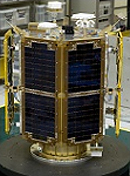닫기
| 인공위성연구센터 소개 | 인공위성관련 정보 | 연구개발 | 인력 양성 | 연구개발시설 | 산업기술지원 | 정보나눔 |
|---|---|---|---|---|---|---|
|
인사말 설립목적과 비전 연혁 조직도 찾아오시는 길 |
인공위성소개 - 인공위성 개요 - 주요 임무 - 내부구조 - 위성체조립 - 환경시험 - 발사 위성개발역사 |
우리별 위성 개발 - 우리별 1호 - 우리별 2호 - 우리별 3호 과학기술위성 개발 - 과학기술위성 1호 - 과학기술위성 2호 - 나로과학위성 - 과학기술위성 3호 차세대 소형위성 개발 초소형위성 군집시스템 개발 핵심우주기술 개발 - 다기능 구조체 - 고성능 탑재컴퓨터 개발 - 홀 추력기용 연료공급장치 - 리튬-이온 배터리 - 초소형 영상 분광기 - 고속데이터 시뮬레이터 과거수행 프로젝트 |
캔위성 체험·경연대회 뉴스페이스 리더 양성 - 사업 개요 - 사업 운영 - FAQ |
지상국 청정실 진동시험기 열진공 챔버 |
환경시험지원 - 진동시험 - 열진공/주기시험 |
공지사항 채용공고 사진자료실 |
| 전체메뉴닫기 | ||||||

Research and Development
STSAT-2C
▶ HOME > Research and Development > STSAT Series > STSAT-2C

∎ STSAT-2c
Following the STSAT-2A and STSAT-2B, the STSAT-2C was the third satellite to be launched from the first Korean-developed launch vehicle KSLV-1 at the Naro Space Center. STSAT-2C has a weight of 100kg, a 300x1,500km elliptical orbit, and was launched on January 30, 2013.STSAT-2C successfully entered orbit and is currently carrying out missions to verify domestically developed space technologies such as precision orbit technologies (beacon transmission, satellite laser ranging (SLR) via Laser Retro-reflector Array (LRA), Reaction Wheel Assembly (RWA), and Femto-second Laser Oscillator (FSO), as well as conducting space environment observation in an elliptical orbit using the space science payload.
- To verify the orbit injection capability of the KSLV-1 launch vehicle
- To conduct space environment observation around a 300x1,500km elliptical orbit
- To verify leading space technologies in orbit
| Orbit | altitude 300×1500km |
| Size | 759x906x1134 mm |
| Weight | < 100kg |
| Power Rating | 80W |
| Attitude Control | 3-axis stabilization, < ± 10 deg. pointing accuracy |
| Data Transmission |
Satellite control: S-band (2GHz) Data Reception: X-band (8GHz) |
| Payloads |
Orbit Determination - Laser Retro-reflector Array (LRA) - S-band Transmit (Beacon Signal@LEOP) Space Science Observation - Ionospheric sounder - Space Radiation Effects Monitor Space Technology Demonstration - Femto-second Laser Oscillator (FSO) - IR Sensor (IRS) - Reaction Wheel Assembly (RWA) |
| Core Technologies |
FPGA-based on-board computer Li-ion Battery System |


